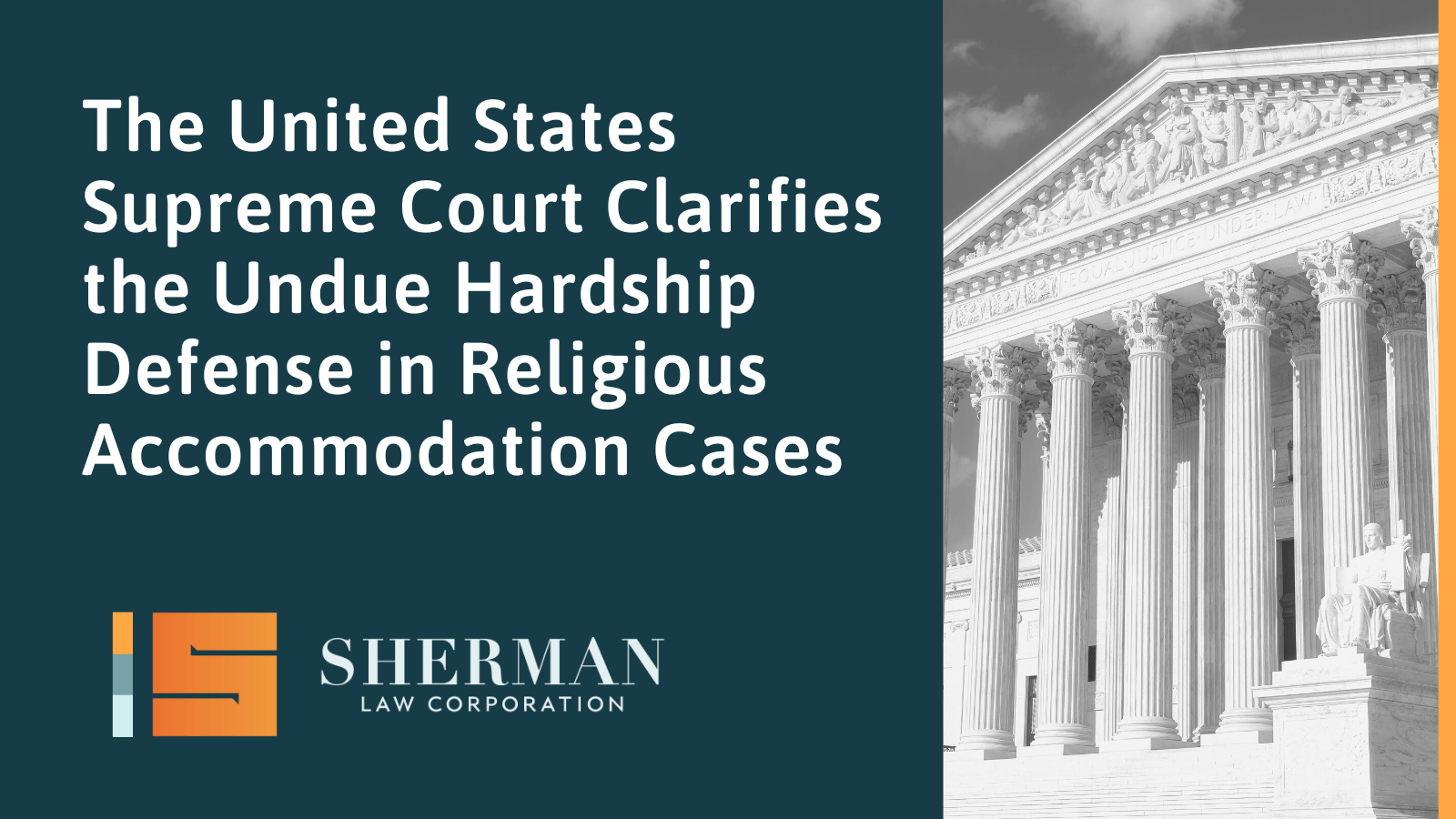
2021 will be a challenging year for California employers as they struggle to survive while COVID-19 continues to plague the workplace.
At Sherman Law Corporation, we know that these challenges can be difficult without proper guidance, which is why we provide California employers with representation and legal guidance.
This year, we expect that employers will likely be faced with these likely issues:
-
Off-the-clock work
Employers must pay nonexempt employees for all hours worked, including overtime pay required by both federal and state law. And in many states, employers must ensure employees take mandatory meal and rest breaks.
Accurate timekeeping and break time compliance is more challenging when nonexempt employees are not in the physical workplace and may be working more variable schedules than before the pandemic began.
We expect to see increased litigation over claims of “off-the-clock work” by teleworking employees.
This has always been a challenging issue for employers but is compounded by the significant increase in telework. Work-at-home policies and careful tracking of hours worked, meal and rest breaks are key to minimize liability.
-
Expense reimbursement
Many employees have incurred costs associated with telework. Depending on the jurisdiction, an employer may have to reimburse the employee for costs associated with telework arrangements.
Several class-action lawsuits have been filed for the costs of prorated home internet and cell phone plans, and even for prorata rent for home offices. Attorneys’ fees are recoverable for business expense reimbursements, so even if the amount is small, when multiplied by all employees with attorneys’ fees will add up.
Employers that previously offered a nominal stipend for home internet access and cell phone use are being surprised with claims the stipend is now disproportionate to the time spent on work functions. Stipends must cover business use.
Various methods of computing the stipend and communicating it to employees will best protect California employers.
-
Exemption status
There may be potential changes to employees’ exempt status brought about by changes in job duties for exempt workers.
For example, outside sales persons who no longer meet the exemption must be reclassified. Pre-pandemic exempt managers who are not spending more than 50% of the time making independent decisions must be reclassified, as well.
-
Pay rates
Consider the calculation of the regular rate of pay for overtime when disbursing “hazard pay” bonuses.
-
Selective recalls from furlough
As workers return to pre-pandemic operations or return employees from furlough, they should be mindful of Worker Adjustment and Retraining Notification (WARN) Act obligations.
This is especially true where federal funding to maintain jobs (such as under the Paycheck Protection Program) may be running out, and employers are facing the unwelcome prospect of having to let workers go, potentially triggering WARN notice requirements.
Employers need to closely examine and understand their WARN exceptions and obligations when returning employees or reinstituting layoffs and furloughs. Several states also have their own mini-WARN laws (including California) to consider and analyze.
-
Protecting High-Risk Individuals
When returning staff to the workplace, even when you believe you’re acting in an employee’s best interests to protect high-risk individuals can create legal liability.
The EEOC has made clear that employers may not prevent older staff or pregnant employees from returning to work if they wish to do so, even if the employer believes it is protecting these workers from risk.
-
Vaccinations
While employers hope a COVID-19 vaccine will enable them to return to some semblance of a pre-pandemic workplace, there will be significant delays until a vaccine is available for the general public.
From an employment perspective, employers need to consider a broad range of issues including but not limited to:
- Equal employment opportunity compliance,
- Labor relations,
- Workers’ compensation,
- Employee safety, and
- Other factors such as the anti-vaccine movement.
Once the vaccine is available to employees, issues will arise when an employee cannot or will not take the vaccine for religious, medical, or personal reasons.
Also, be prepared to weigh competing demands from staff concerned about their own health vulnerabilities if co-workers do not get vaccinated. Vaccination policies that address these issues is strongly recommended.
-
Paid-leave protections.
Although the paid leave provisions of the Families First Coronavirus Response Act (which we covered in this blog) expired Dec. 31, 2020, numerous state and local governments, (including LA County) have adopted new laws, ordinances, or regulations providing or extending paid leave to employees during the pandemic.
While the new pandemic-related Tax Relief Act of 2020 does not require employers to provide employees with paid sick or family leave after Dec. 31, 2020, employers who choose to allow employees to take such leave for a pandemic-related reason through March 31, 2021, can claim the payroll tax credit.
-
Providing a safe workplace.
Employers’ duty to ensure staff’s safety and health is more difficult than ever. Employers are balancing federal guidance and recommendations with evolving local guidance and orders.
Cal-OSHA’s regulations, for example, are very onerous and are starting to issue citations for violations.
-
Retaliation.
Employees who have continued to work during the pandemic increasingly are filing complaints regarding a variety of issues, including:
- Personal protective equipment (PPE),
- Social distancing,
- Mask regulations, and
- Other health and safety measures.
At the same time, many employers face the reality of changing or reducing hours, cutting pay, or eliminating positions due to the decline in economic activity. The combination of increased health and safety complaints with a simultaneous escalation of employment actions many employers must take due to business necessity has also led to an increase in retaliation claims being filed under state and federal law.
Have more COVID-related employer questions? Contact Sherman Law Corporation
All these rules and regulations can be overwhelming. If you have questions about COVID policies and how they affect your business, Sherman Law Corporation is here to help. We work with clients to resolve disputes and make sure they are legally compliant. Contact Lisa Sherman at lisa@sherm-law.com or call at (323) 488-2087.




